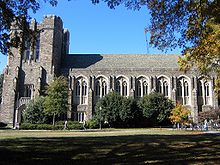
The Bodleian Library is the main research library of the University of Oxford. Founded in 1602 by Sir Thomas Bodley, it is one of the oldest libraries in Europe. With over 13 million printed items, it is the second-largest library in Britain after the British Library. Under the Legal Deposit Libraries Act 2003, it is one of six legal deposit libraries for works published in the United Kingdom, and under Irish law it is entitled to request a copy of each book published in the Republic of Ireland. Known to Oxford scholars as "Bodley" or "the Bod", it operates principally as a reference library and, in general, documents may not be removed from the reading rooms.

The Vatican Apostolic Library, more commonly known as the Vatican Library or informally as the Vat, is the library of the Holy See, located in Vatican City, and is the city-state's national library. It was formally established in 1475, although it is much older—it is one of the oldest libraries in the world and contains one of the most significant collections of historical texts. It has 75,000 codices from throughout history, as well as 1.1 million printed books, which include some 8,500 incunabula.

Douglas Maitland Knight was an American educator, businessman, and author. He was a former professor of literature at Yale University prior to his presidency at Lawrence College from 1954 to 1963. Stemming from his work at Lawrence College was his subsequent term as president of Duke University, where he served until he resigned in 1969 following student protests and the takeover of the university's main administrative building by students calling for a black cultural center and African-American studies program, among other things. Controversy over these issues led to his transition into the business world at RCA and Questar Corporation. Knight never fully retired, and was known to consult for Questar's board of trustees years after his departure.

The Cornell University Library is the library system of Cornell University. As of 2014, it holds over eight million printed volumes and over a million ebooks. More than 90 percent of its current 120,000 periodical titles are available online. It has 8.5 million microfilms and microfiches, more than 71,000 cubic feet (2,000 m3) of manuscripts, and close to 500,000 other materials, including motion pictures, DVDs, sound recordings, and computer files, extensive digital resources, and the University Archives. It is the 16th-largest library in North America, ranked by number of volumes held, and the 13th-largest research library in the U.S. by both titles and volumes held.
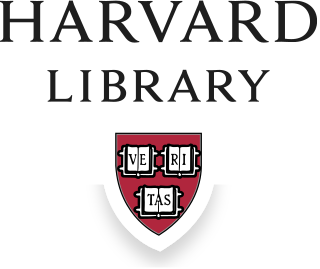
Harvard Library is the network of libraries and services at Harvard University, a private Ivy League university in Cambridge, Massachusetts. Harvard Library is the oldest library system in the United States and both the largest academic library and largest private library in the world. Its collection holds over 20 million volumes, 400 million manuscripts, 10 million photographs, and one million maps.
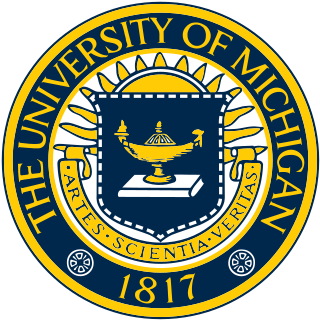
The University of Michigan Library is the academic library system of the University of Michigan. The university's 38 constituent and affiliated libraries together make it the second largest research library by number of volumes in the United States.

The Divinity School at Duke University in Durham, North Carolina, is one of ten graduate or professional schools within Duke University. It is also one of thirteen seminaries founded and supported by the United Methodist Church. It has 39 regular rank faculty and 15 joint, secondary or adjunct faculty, and, as of 2017, an enrollment of 543 full-time equivalent students. The current dean of the Divinity School is the Rev. Dr. Edgardo Colón-Emeric, who assumed the deanship on August 31, 2021. Former deans include the prominent New Testament scholar Richard B. Hays, who stepped down in 2015.

Columbia University Libraries is the library system of Columbia University and one of the largest academic library systems in North America. With 15.0 million volumes and over 160,000 journals and serials, as well as extensive electronic resources, manuscripts, rare books, microforms, maps, and graphic and audio-visual materials, it is the fifth-largest academic library in the United States and the largest academic library in the State of New York. Additionally, the closely affiliated Jewish Theological Seminary Library holds over 400,000 volumes, which combined makes the Columbia University Libraries the third-largest academic library, and the second-largest private library in the United States.

The Yale University Library is the library system of Yale University in New Haven, Connecticut. Originating in 1701 with the gift of several dozen books to a new “Collegiate School," the library's collection now contains approximately 14.9 million volumes housed in fifteen university buildings and is the third-largest academic library system in North America and the second-largest housed on a singular campus.
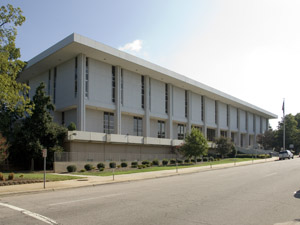
The State Library of North Carolina is an institution which serves North Carolina libraries, state government employees, genealogists, and the citizens of North Carolina. The library is the main depository for North Carolina state publications and serves the needs of North Carolina government agencies and state government employees by providing access to information resources that are vital to public decision-making and economic development.

David Mark Rubenstein is an American lawyer, businessman, and philanthropist. A former government official, he is a co-founder and co-chairman of The Carlyle Group, a private equity firm based in Washington, D.C. Rubenstein is also the principal owner of the Baltimore Orioles of Major League Baseball (MLB), acquiring the team in 2024 for $1.7 billion.
The Hamilton Library at the University of Hawaiʻi at Mānoa is the largest research library in the state of Hawaii. The Library serves as a key resource for the flagship Manoa campus as well as the other University of Hawaiʻi system campuses.
The Kenneth Willis Clark Collection of Greek Manuscripts in the David M. Rubenstein Rare Book & Manuscript Library, Duke University contains over one hundred manuscripts — in both roll and codex form — dating from the 9th to the 17th century. The collection as a whole is named in his honor and includes manuscripts collected and donated by Kenneth Clark as well as manuscripts acquired from other sources.
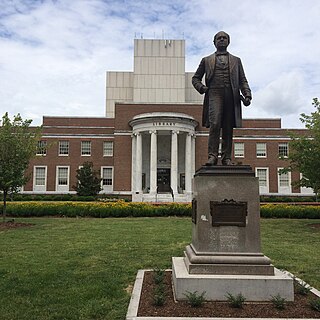
The University of North Carolina at Greensboro University Libraries system has two branches on campus, both located in Greensboro, NC. These include the Walter Clinton Jackson Library and the Harold Schiffman Music Library. Affiliated campus libraries include the Teaching Resource Center and SELF Design Studio in the School of Education, the Interior Architecture Library in the Gatewood Studio Arts Building, and the Intercultural Resource Center located in the Elliot University Center. During the fall and spring semesters, Jackson Library provides a 24/5 study space for UNCG students, faculty and staff with UNCG ID from 12 am Monday – 7:00 am Friday. Michael A. Crumpton is the current Interim Dean of the libraries.

The Rare Book and Manuscript Library is principal repository for special collections of Columbia University. Located in New York City on the university's Morningside Heights campus, its collections span more than 4,000 years, from early Mesopotamia to the present day, and span a variety of formats: cuneiform tablets, papyri, and ostraca, medieval and Renaissance manuscripts, early printed books, works of art, posters, photographs, realia, sound and moving image recordings, and born-digital archives. Areas of collecting emphasis include American history, Russian and East European émigré history and culture, Columbia University history, comics and cartoons, philanthropy and social reform, the history of mathematics, human rights advocacy, Hebraica and Judaica, Latino arts and activism, literature and publishing, medieval and Renaissance manuscripts, oral history, performing arts, and printing history and the book arts.

Princeton University Library is the main library system of Princeton University. With holdings of more than 7 million books, 6 million microforms, and 48,000 linear feet of manuscripts, it is among the largest libraries in the world by number of volumes. The main headquarters of the university system is the Harvey S. Firestone Memorial Library building, named after tire magnate Harvey Firestone. Additionally, Princeton is part of the Research Collections and Preservation Consortium (ReCAP) along with Columbia Libraries, Harvard Library and New York Public Library.
Herbert Lee Waters (1902–1997) was an American photographer and filmmaker. Waters was born in Caroleen, North Carolina. He worked as a studio photographer in Lexington, North Carolina. Waters also created over 252 short films that make up a series, Movies of Local People, depicting life in small towns in North Carolina, South Carolina, Tennessee, and Virginia. Waters arranged screenings of the short films at local cinemas. They were usually played before the feature film of the screening. Waters made the films profitable for himself through admission prices and contributions from local businesses that wished to appear in the films.
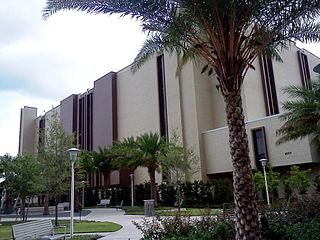
The University of South Florida Tampa Library is the main research library for the University of South Florida. Housing over 1.3 million books, academic journals and electronic resources, including 52,000 e-journal subscriptions, 443,000 e-books, and over 800 databases, the library has more than 2 million visitors each year. The library offers tutoring and writing services, laptops, a career resource center, and course reserves. The facility houses several special and digital collections, including literature, oral histories, photographs, artifacts, and the university archives. The current Dean of USF Libraries is Todd Chavez.
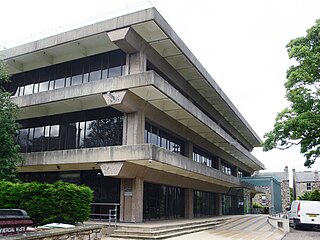
The University of St Andrews Library dates back to the early 17th century but its books have been collected over some 600 years since the university was founded in 1413. It holds one of the most extensive collections of the research libraries in the United Kingdom with more than one million volumes. In addition to 210,000 printed books in special collections, it has large manuscript and photographic collections while its archives date back to the early 15th century. The library's current role is to support research, scholarship and learning with high-quality services backed by preservation, promotion and exploitation of its collections.
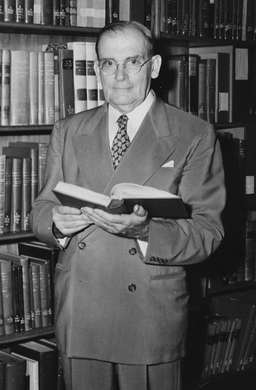
Joseph Penn Breedlove (1874–1955) was an American librarian and author. In 48 years of service, he oversaw the growth of the Duke University Library from a single room in 1898 to millions of books and documents in modern facilities at his retirement in 1946. He was a founding member of the North Carolina Library Association and twice its president. His history of the Duke University libraries was published in 1955.



